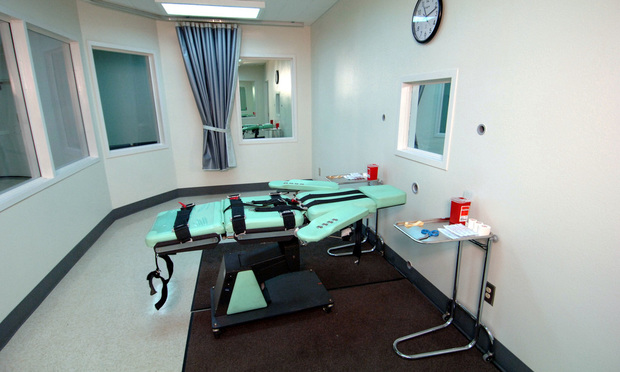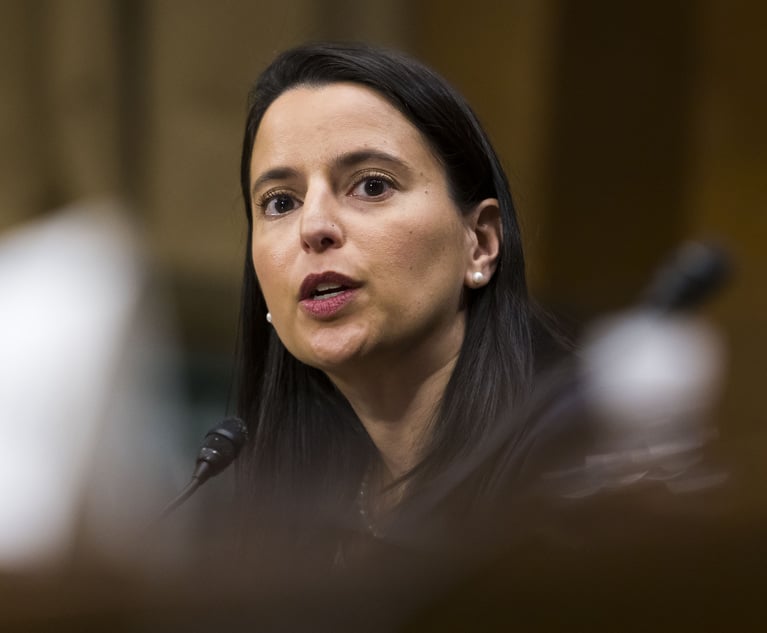Newsom Set to Call a Halt to Executions in California
The governor plans to sign an executive order Wednesday suspending the death penalty in California and granting reprieves for the 737 inmates on the state's largest-in-the-nation Death Row.
March 12, 2019 at 11:44 PM
2 minute read
 Lethal injection room at San Quentin State Prison (Photo: California Department of Corrections and Rehabilitation via Wikimedia Commons)
Lethal injection room at San Quentin State Prison (Photo: California Department of Corrections and Rehabilitation via Wikimedia Commons)
Gov. Gavin Newsom plans to sign an executive order Wednesday suspending the death penalty in California and granting reprieves for the 737 inmates on the state's largest-in-the-nation Death Row.
The order also will withdraw the state's lethal injection protocol, the subject of years of litigation and close the death chamber at San Quentin State Prison. Information released by the governor's office Tuesday night does not suggest Newsom will commute any sentences. The directive will not release any prisoners or alter any current sentences.
“I do not believe that a civilized society can claim to be a leader in the world as long as its government continues to sanction the premeditated and discriminatory execution of its people,” Newsom plans to say Wednesday, according to excerpts of prepared remarks provided by the governor's press office Tuesday. “In short, the death penalty is inconsistent with our bedrock values and strikes at the very heart of what it means to be a Californian.”
The death penalty was last carried out in the state in 2006, when Clarence Ray Allen was executed by lethal injection. Capital punishment, approved by voters in 1978, has been on hold amid lawsuits challenging the lethal injection method and the administrative process for approving its use. Twenty-five inmates on Death Row have exhausted all their appeals.
California voters in 2016 rejected a ballot initiative to end the death penalty and instead approved Proposition 66, which mandated a series of changes to the appellate process and lethal injection protocols aimed at speeding up capital sentences. The state Supreme Court upheld the initiative in 2017.
“Death penalty opponents made their case to the people and lost,” initiative backer Kent Scheidegger, legal director of the Criminal Justice Legal Foundation, said after the court's ruling.
This content has been archived. It is available through our partners, LexisNexis® and Bloomberg Law.
To view this content, please continue to their sites.
Not a Lexis Subscriber?
Subscribe Now
Not a Bloomberg Law Subscriber?
Subscribe Now
NOT FOR REPRINT
© 2025 ALM Global, LLC, All Rights Reserved. Request academic re-use from www.copyright.com. All other uses, submit a request to [email protected]. For more information visit Asset & Logo Licensing.
You Might Like
View All
Chicago Law Requiring Women, Minority Ownership Stake in Casinos Is Unconstitutional, New Suit Claims
5 minute read

Fresh lawsuit hits Oregon city at the heart of Supreme Court ruling on homeless encampments
4 minute readTrending Stories
- 1Brooklyn Prosecutor Returns to Private Practice to Co-Found Wrongful Conviction Boutique
- 2Hasbro Faces Shareholder Ire Over 'Excessive' Toy, Game Inventory
- 3Paul Hastings’ New Partner Talks Giving Control to Agentic AI, EU AI Act Impacts, and More
- 4Judge Pauses Deadline for Federal Workers to Accept Trump Resignation Offer
- 5DeepSeek Isn’t Yet Impacting Legal Tech Development. But That Could Soon Change.
Who Got The Work
J. Brugh Lower of Gibbons has entered an appearance for industrial equipment supplier Devco Corporation in a pending trademark infringement lawsuit. The suit, accusing the defendant of selling knock-off Graco products, was filed Dec. 18 in New Jersey District Court by Rivkin Radler on behalf of Graco Inc. and Graco Minnesota. The case, assigned to U.S. District Judge Zahid N. Quraishi, is 3:24-cv-11294, Graco Inc. et al v. Devco Corporation.
Who Got The Work
Rebecca Maller-Stein and Kent A. Yalowitz of Arnold & Porter Kaye Scholer have entered their appearances for Hanaco Venture Capital and its executives, Lior Prosor and David Frankel, in a pending securities lawsuit. The action, filed on Dec. 24 in New York Southern District Court by Zell, Aron & Co. on behalf of Goldeneye Advisors, accuses the defendants of negligently and fraudulently managing the plaintiff's $1 million investment. The case, assigned to U.S. District Judge Vernon S. Broderick, is 1:24-cv-09918, Goldeneye Advisors, LLC v. Hanaco Venture Capital, Ltd. et al.
Who Got The Work
Attorneys from A&O Shearman has stepped in as defense counsel for Toronto-Dominion Bank and other defendants in a pending securities class action. The suit, filed Dec. 11 in New York Southern District Court by Bleichmar Fonti & Auld, accuses the defendants of concealing the bank's 'pervasive' deficiencies in regards to its compliance with the Bank Secrecy Act and the quality of its anti-money laundering controls. The case, assigned to U.S. District Judge Arun Subramanian, is 1:24-cv-09445, Gonzalez v. The Toronto-Dominion Bank et al.
Who Got The Work
Crown Castle International, a Pennsylvania company providing shared communications infrastructure, has turned to Luke D. Wolf of Gordon Rees Scully Mansukhani to fend off a pending breach-of-contract lawsuit. The court action, filed Nov. 25 in Michigan Eastern District Court by Hooper Hathaway PC on behalf of The Town Residences LLC, accuses Crown Castle of failing to transfer approximately $30,000 in utility payments from T-Mobile in breach of a roof-top lease and assignment agreement. The case, assigned to U.S. District Judge Susan K. Declercq, is 2:24-cv-13131, The Town Residences LLC v. T-Mobile US, Inc. et al.
Who Got The Work
Wilfred P. Coronato and Daniel M. Schwartz of McCarter & English have stepped in as defense counsel to Electrolux Home Products Inc. in a pending product liability lawsuit. The court action, filed Nov. 26 in New York Eastern District Court by Poulos Lopiccolo PC and Nagel Rice LLP on behalf of David Stern, alleges that the defendant's refrigerators’ drawers and shelving repeatedly break and fall apart within months after purchase. The case, assigned to U.S. District Judge Joan M. Azrack, is 2:24-cv-08204, Stern v. Electrolux Home Products, Inc.
Featured Firms
Law Offices of Gary Martin Hays & Associates, P.C.
(470) 294-1674
Law Offices of Mark E. Salomone
(857) 444-6468
Smith & Hassler
(713) 739-1250







